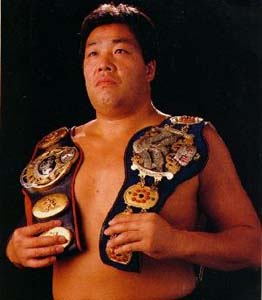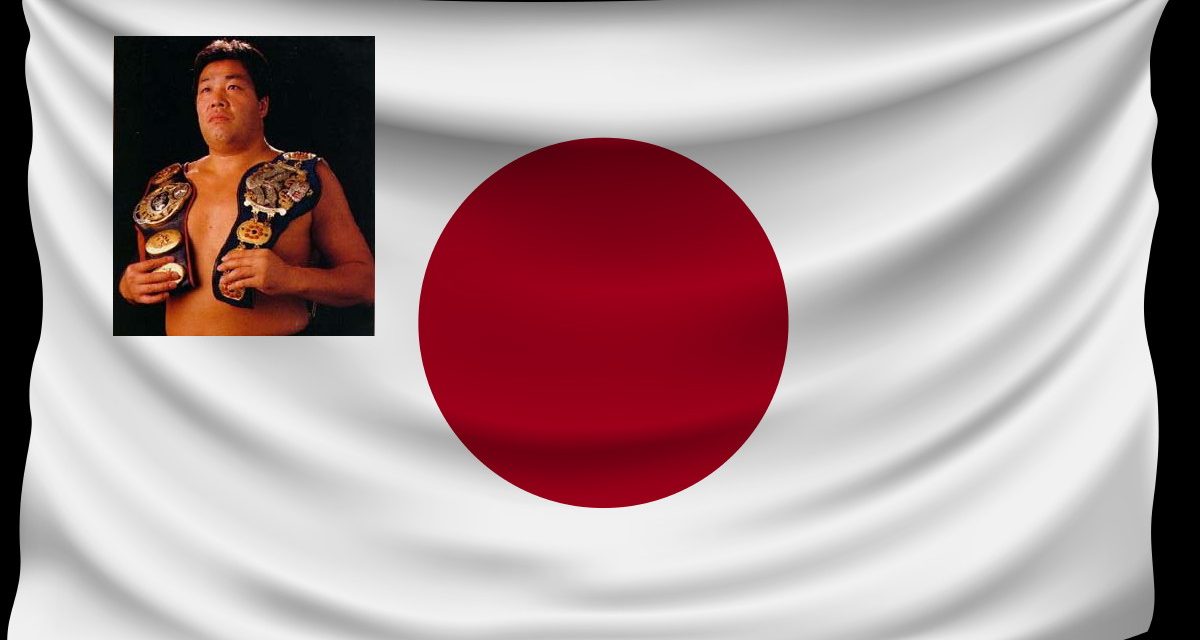It was supposed to be a peaceful, quiet vacation. Somehow when the phone rang early Tuesday morning, waking me from the most blissful sleep I had in weeks, I knew it was bad news.
I crawled out of bed. I slowly stumbled to my feet. I was barely conscious. I thought about pouring a bowl of cereal. Instead, I answered the phone. It was Greg Oliver on the line. I looked at my watch. 9:30 a.m. Thought to myself “This better be important, Greg.”
“Got some bad news, John.” I figured as much. Greg knows better than to call me that early unless it’s urgent. Still unconscious, I muttered “What?” The only thing I remember next were the words “Jumbo Tsuruta died”. And with that, a part of my world came crumbling down.
So much for my vacation.
Tsuruta? Dead? Couldn’t be!?!? He can’t possibly be dead… could he? Was this some cruel joke?
Sadly, it was no joke.
And so we bid farewell to another legend of the mat game. Tsuruta, more than any other heavyweight, embodied pro wrestling in Japan. Nobody could match his work ethic. A giant in the wrestling landscape, Tsuruta was the best heavyweight wrestler from Japan. Ever.

Jumbo Tsuruta. Photo courtesy the excellent Puroresu Dojo.
Not Giant Baba. Not Antonio Inoki. Not Rikidozan.
Jumbo Tsuruta.
Tsuruta was a wrestler, not a sports entertainer. He had a thriving spirit and respect for the sport. He took it seriously. It was a sport to him. It wasn’t sports entertainment. He worked hard in the ring and yet, he carried himself outside the squared circle with a quiet, humble grace. But his demeanour was the only thing humble about him.
His was a talent on loan from God.
I don’t mean that to sound blasphemous, but that’s the only way I can describe the depth of his wrestling ability.
Using the wrestling ring as his personal canvas, he created several masterpieces, each match better than the previous one. He helped pioneer Japanese wrestling, ushering in a more advanced, physically demanding and athletic style. There were no wasted movements with Tsuruta. Each move in a match meant something. Each match meant something. He was a master storyteller. Nobody could tell a story within the confines of a wrestling match better than Tsuruta.
Nobody.
As a teenager in high school, I use to read about Tsuruta’s exploits in Japan in newsletters and magazines. Soon after, I started watching tapes of Japanese wrestling and saw for myself just how good he was. I marvelled at how he was able to work such a physical style and remain on top of his game year after year. Many was the time my jaw dropped to the ground after watching Tsuruta work a 60-minute match in the most athletically demanding wrestling promotion before the most discerning and critical wrestling fans in the world.
He was a bastion of ring work and set the standard for excellence among heavyweights in Japan. And let me tell you something else: He could have worked circles around The Rock, HHH, Kevin Nash and any other sports entertainer of today.
He was the Japanese equivalent of Ric Flair.
And now he’s gone. And the wrestling world goes on, with its Monday night wars, its cookie-cutter, assembly line pay-per-views and its sports entertainers.
No time to stop and remember.
Tsuruta’s three Triple Crown titles, the two Carnival Championships, the reign as AWA World champion, all the accolades and all the titles… they’re just memories now. Shoved at the bottom of a drawer, only to be taken out when we’re feeling sentimental about the good old days. That’s what the Russos, the McMahons and the Bischoffs of the world would have us believe.
But unbeknownst to them, Tsuruta lives on. Maybe not in body, but certainly in spirit.
Because they can’t kill the memory of 60-minute draws with then-NWA World Champion Ric Flair in Yokohama and Tokyo. They can’t erase the groundbreaking feud between Riki Choshu’s Army ‘Ishin Gundan’ and Tsuruta’s clique that set Japan ablaze from 1984 to 1986; a feud that was Eric Bischoff’s inspiration for the NWO. They can’t ignore the blood he spilt battling Bruiser Brody, Abdullah the Butcher and Stan Hansen all across Japan.
And they can’t rub out what happened on June 9th, 1990 in Tokyo’s Nippon Budokan Hall.
The top man in the company at the time, Tsuruta was scheduled to work with a mid-carder by the name of Mitsuhara Misawa. All Japan was looking to help elevate a new wrestler to stardom. They knew a win over Tsuruta would establish Misawa.
Tsuruta could see the handwriting on the wall. He knew this match was a symbolic passing of the torch from the old to the new. He knew his days as the top man were numbered. He could have put up a fuss and made life difficult. He had the stroke to do it.
Instead, he gave the performance of his life, reducing the sold out crowd to tears in what stands as one of the most memorable matches in wrestling history. It was a textbook case of storytelling, and the match quickly became required viewing for bookers in the U.S. who were stuck for ideas trying to help elevate their own young stars.
It was another masterpiece from the virtuoso.
Tsuruta didn’t just ‘job’ to Misawa that night. He put him ‘over’. He had made Misawa’s career and sent him down a path that led him to become the wrestler of the ’90s.
Not too long ago, Hulk Hogan found himself in the exact same position with Billy Kidman. He knew a win by Kidman would elevate him. Always the politician, Hogan ‘jobbed’ to Kidman. But he didn’t ‘put him over’.
Not too long ago, HHH balked at the idea of working with Chris Jericho, saying he was too small and had to be carried, forgetting there was once a time he had to be carried (still does if you ask me).
And that’s the difference between sports entertainers like HHH, The Rock and Hogan and a wrestler like Jumbo Tsuruta.
Pride. Pride in the sport of pro wrestling, pride in doing what’s right for the business, pride in one’s craft.
More than anything else, that is the true legacy of Jumbo Tsuruta. Let’s never forget it.
R.I.P.
RELATED LINKS
- May 27, 2000: Jumbo Tsuruta memorial planned
- May 17, 2000: Jumbo, Baba and The Destroyer
- May 16, 2000: Jumbo Tsuruta dies of kidney failure
- May 16, 2000: Friends remember Jumbo Tsuruta

